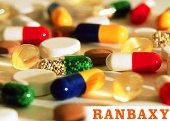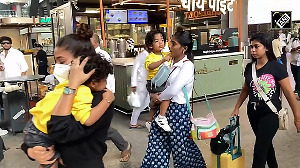 Even as India's largest drug maker, Ranbaxy, is confident of launching its first 'new drug' by January 2012 to combat malaria in the country, the global euphoria the potential drug had generated in the initial stages of its research seems missing.
Even as India's largest drug maker, Ranbaxy, is confident of launching its first 'new drug' by January 2012 to combat malaria in the country, the global euphoria the potential drug had generated in the initial stages of its research seems missing.
Health experts attribute this to the absence of international approval for the drug. About 90 per cent of malaria infections are reported from sub-Saharan Africa.
Other tropical regions, including India, account for the rest.
The Ranbaxy drug, developed after decade-long research that involved several international players, is known to have received conditional approval for adult doses in India.
The company is awaiting acceptability for clinical trial data of the new drug in various foreign jurisdictions.
According to the World Malaria Report 2010, there were 225 million cases of the disease and an estimated 781,000 deaths in 2009.
Ninety per cent of the global malaria burden resides in sub-Saharan Africa, the recipient of 80 per cent of external funding for malaria control.
While many countries, organisations, and companies provide these resources, a majority of these funds are channelled through the Global Fund to Fight AIDS, Tuberculosis and Malaria, the World Bank Booster Program for Malaria Control in Africa and the US President's Malaria Initiative (US-PMI).
Nearly $5-6 billion is estimated as the annual requirement to scale up and sustain the progress towards malaria elimination globally.
India has made a budgetary allocation (for 2011-12) of about Rs 500 crore (Rs 5 billion) towards the National Vector Borne Disease Control Programme for the prevention and treatment of diseases such as malaria, kala-azar, Japanese encephalitis, filaria and dengue.
Of the 17 medicines approved by the World Health Organisation for global treatment of malaria, more than half are supplied by Indian drug companies such as Cipla Ltd, IPCA Laboratories and Ajanta Pharma.
Other players include multinationals such as Sanofi Aventis and Novartis. A WHO prequalification is essential for including malaria drugs under any global programme.
Ranbaxy also needs this international approval if it has to supply its medicine for the treatment of one of the most fatal forms of malaria, known as falciparum malaria infection.
Falciparum malaria accounts for 98 per cent infections reported from Africa and 40-50 per cent in India, public health experts say.
The Ranbaxy drug, a combination of arterolane maleate and piperaquine phosphate, is expected to be more effective with fewer doses to combat this infection.
In an emailed response, Medicines for Malaria Venture, the Geneva-based not-for-profit foundation which initiated the research on this drug candidate 10 years ago and handed over the development and marketing rights to Ranbaxy in 2003, said it 'applauds the development of new medicines against malaria'.
"We are keenly awaiting the chance to review the phase III (final clinical trial) data, so we can fully understand the potential benefits to patients," David Reddy, CEO of MMV, stated.
Ranbaxy got involved with the research project initiated by MMV in 2003 when Swiss drug multinational Roche, the original industry partner of MMV, decided to hand over its development and marketing rights (of the potential drug candidate).
Four years later, MMV stopped funding the project and transferred the rights for development and marketing of the medicine to Ranbaxy after it reviewed the progress of the clinical trials in November 2006.
According to MMV's annual report for 2006, the decision was taken after 'the review of the preliminary data and other portfolio priorities'.
Despite the apparent setback, Ranbaxy held on to the potential drug and roped in the Department of Science and Technology to part-fund the project.
The DST-Ranbaxy agreement made it obligatory for Ranbaxy to supply drugs to meet domestic public health demands at a price just 10 per cent more than its actual cost of production.
Any Central or state government agency can raise this demand. DST is also entitled to three per cent of the net profit Ranbaxy makes if the company exports the drug.
Ranbaxy declined to provide any details of its anti-malaria drug, though in a conference call with analysts on November 9, the company management informed the drug would be in the domestic market by December-end or early next year.












 © 2025
© 2025